PPSolveFactory solves the system of linear equations to interpolate from a grid of points using higher order polynomials, creating a PolynomialPatch object. The order of the polynomial is user-defined. More...
#include <PPSolveFactory.h>
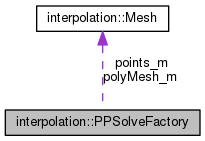
Public Member Functions | |
| PPSolveFactory (Mesh *points, std::vector< std::vector< double > > values, int polyPatchOrder, int smoothingOrder) | |
| ~PPSolveFactory () | |
| PolynomialPatch * | solve () |
Static Public Member Functions | |
| static std::vector < std::vector< int > > | getNearbyPointsSquares (int pointDim, int polyOrderLower, int polyOrderUpper) |
Private Member Functions | |
| void | getPoints () |
| void | getValues (Mesh::Iterator it) |
| void | getDerivPoints () |
| void | getDerivs (Mesh::Iterator it) |
| std::vector< double > | outOfBoundsPosition (Mesh::Iterator outOfBoundsIt) |
| PolynomialCoefficient | getDeltaIterator (Mesh::Iterator it1, Mesh::Iterator it2, int valueIndex) |
Static Private Member Functions | |
| static void | nearbyPointsRecursive (std::vector< int > check, size_t checkIndex, size_t polyPower, std::vector< std::vector< int > > &nearbyPoints) |
Private Attributes | |
| int | polyPatchOrder_m |
| int | smoothingOrder_m |
| int | polyDim_m |
| int | valueDim_m |
| Mesh * | polyMesh_m |
| Mesh * | points_m |
| std::vector< std::vector < double > > | values_m |
| std::vector < SquarePolynomialVector * > | polynomials_m |
| std::vector< std::vector < double > > | thisPoints_m |
| std::vector< std::vector < double > > | thisValues_m |
| std::vector< std::vector < double > > | derivPoints_m |
| std::vector< std::vector < double > > | derivValues_m |
| std::vector< std::vector< int > > | derivOrigins_m |
| std::vector< std::vector< int > > | derivIndices_m |
| std::vector< MVector< double > > | derivPolyVec_m |
| std::vector< int > | derivIndexByPower_m |
| std::vector< std::vector < std::vector< int > > > | edgePoints_m |
| std::vector< std::vector< int > > | smoothingPoints_m |
Detailed Description
PPSolveFactory solves the system of linear equations to interpolate from a grid of points using higher order polynomials, creating a PolynomialPatch object. The order of the polynomial is user-defined.
The PPSolveFactory can be used to match nearby points for smoothing or for straight fitting.
PPSolveFactory generates polynomials on a grid that is at the centre point of each of the mesh squares; PPSolveFactory picks nearby points in a square around the PPSolveFactory, picked by getNearbyPointsSquares. Two sets of points are chosen; the nearest points are used for fitting; smoothing is performed by choosing the points on the edge of the grid, and smoothing to derivatives on these points.
Because we work in a square grid, we have matching polynomials and derivatives; so e.g. 2D points are (0, 0), (1, 0), (0, 1), (1, 1) so corresponding polynomial coefficients that we solve for are x^0 y^0, x^1 y^0, x^0 y^1, x^1 y^1; note that hence we define "first order" to be all terms with no single x/y vector power > 1; i.e. "first order" in x OR first order in y, etc. We allow products so long as the maximum power in any one dimension <= 1
The PPSolveFactory sits on top of SolveFactory; PPSolveFactory has the job of picking values and derivatives for fitting, SolveFactory then does the actual solve for each individual polynomial.
Definition at line 65 of file PPSolveFactory.h.
Constructor & Destructor Documentation
| interpolation::PPSolveFactory::PPSolveFactory | ( | Mesh * | points, |
| std::vector< std::vector< double > > | values, | ||
| int | polyPatchOrder, | ||
| int | smoothingOrder | ||
| ) |
Constructor
- Parameters
-
points Set of points on which values are stored. Must be a rectangular grid. PPSolveFactory takes ownership of points (will delete on exit). The solve will return a wrong answer if the grid does not have regular spacing. values Set of values to which we fit. Must be one value per mesh point and each value must have the same size. polyPatchOrder The order of the fitted part of the polynomial. smoothingOrder The total order of the fitted and the smoothed part of the polynomial. Smoothing order should always be >= polyPatchOrder. So for example if polyPatchOrder is 2 and smoothing order is 2, we get a 2nd order function with no derivative matching. If polyPatchOrder is 2 and smoothing order is 3, we get a 3rd order function with derivative matching in first order at two mesh points from the centre.
Definition at line 63 of file PPSolveFactory.cpp.
References interpolation::Mesh::dual(), edgePoints_m, interpolation::Mesh::end(), getNearbyPointsSquares(), interpolation::Mesh::getPositionDimension(), polyDim_m, polyMesh_m, polyPatchOrder_m, smoothingPoints_m, and interpolation::Mesh::Iterator::toInteger().
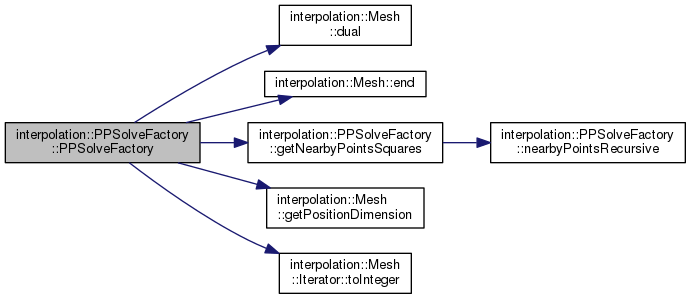
|
inline |
Destructor deletes points_
Definition at line 91 of file PPSolveFactory.h.
Member Function Documentation
|
private |
|
private |
Definition at line 185 of file PPSolveFactory.cpp.
References derivIndexByPower_m, derivIndices_m, derivOrigins_m, derivPoints_m, derivPolyVec_m, edgePoints_m, interpolation::Mesh::getPositionDimension(), interpolation::SquarePolynomialVector::IndexByPower(), interpolation::SquarePolynomialVector::NumberOfPolynomialCoefficients(), points_m, polyPatchOrder_m, pow(), smoothingOrder_m, and smoothingPoints_m.
Referenced by solve().

|
private |
Definition at line 258 of file PPSolveFactory.cpp.
References derivOrigins_m, derivPoints_m, derivPolyVec_m, derivValues_m, interpolation::Mesh::end(), interpolation::Mesh::Iterator::getMesh(), interpolation::Mesh::Iterator::getPosition(), interpolation::Mesh::Iterator::getState(), polyDim_m, polynomials_m, polyPatchOrder_m, smoothingOrder_m, and interpolation::Mesh::Iterator::toInteger().
Referenced by solve().
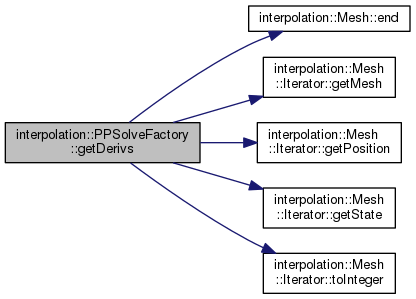
|
static |
Get nearby points in a square pattern
Get nearby points at least poly_order_lower distance away and less than poly_order_upper distance away; e.g. getNearbyPointsSquares(2, 4, 6) will get nearby points on a 2D grid at least 4 grid points and at most 6 grid points, like:
x x x o o x ... x x x o o x x x x o o x o o o o o x o o o o o x x x x x x x ...
Definition at line 347 of file PPSolveFactory.cpp.
References nearbyPointsRecursive().
Referenced by getPoints(), getValues(), PPSolveFactory(), and interpolation::SolveFactory::SolveFactory().

|
private |
Definition at line 141 of file PPSolveFactory.cpp.
References getNearbyPointsSquares(), interpolation::Mesh::getPositionDimension(), points_m, polyPatchOrder_m, and thisPoints_m.
Referenced by solve().

|
private |
Definition at line 156 of file PPSolveFactory.cpp.
References interpolation::Mesh::end(), getNearbyPointsSquares(), interpolation::Mesh::Iterator::getState(), points_m, polyPatchOrder_m, thisValues_m, interpolation::Mesh::Iterator::toInteger(), and values_m.
Referenced by solve().
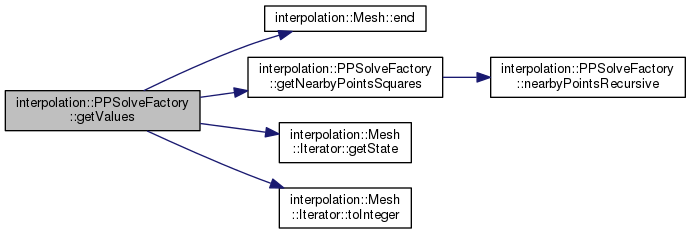
|
staticprivate |
Definition at line 330 of file PPSolveFactory.cpp.
Referenced by getNearbyPointsSquares().
|
private |
Definition at line 116 of file PPSolveFactory.cpp.
References interpolation::Mesh::begin(), interpolation::Mesh::end(), interpolation::Mesh::Iterator::getMesh(), interpolation::Mesh::Iterator::getPosition(), and interpolation::Mesh::Iterator::getState().
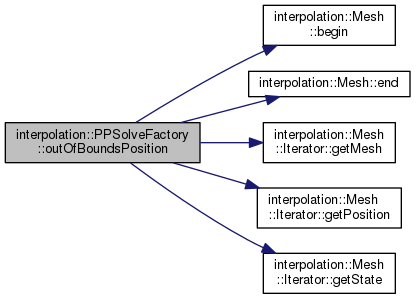
| PolynomialPatch * interpolation::PPSolveFactory::solve | ( | ) |
Solve the system of equations to generate a PolynomialPatch object.
Returns a PolynomialPatch object, caller owns the returned memory.
Definition at line 295 of file PPSolveFactory.cpp.
References interpolation::Mesh::begin(), derivIndices_m, derivPoints_m, derivValues_m, interpolation::Mesh::end(), endl(), getDerivPoints(), getDerivs(), getPoints(), interpolation::Mesh::getPositionDimension(), getValues(), points_m, polyDim_m, polyMesh_m, polynomials_m, polyPatchOrder_m, smoothingOrder_m, thisPoints_m, thisValues_m, and interpolation::Mesh::Iterator::toInteger().
Referenced by SectorMagneticFieldMap::IO::getInterpolatorPolyPatch().
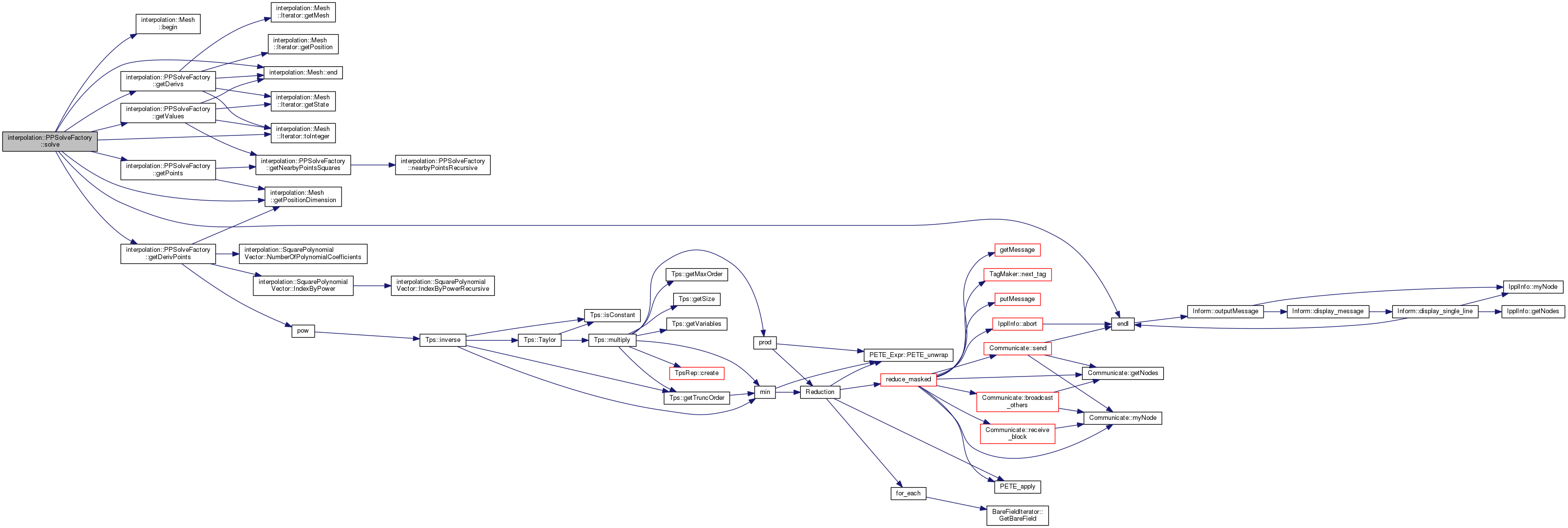
Member Data Documentation
|
private |
Definition at line 153 of file PPSolveFactory.h.
Referenced by getDerivPoints().
|
private |
Definition at line 151 of file PPSolveFactory.h.
Referenced by getDerivPoints(), and solve().
|
private |
Definition at line 150 of file PPSolveFactory.h.
Referenced by getDerivPoints(), and getDerivs().
|
private |
Definition at line 148 of file PPSolveFactory.h.
Referenced by getDerivPoints(), getDerivs(), and solve().
|
private |
Definition at line 152 of file PPSolveFactory.h.
Referenced by getDerivPoints(), and getDerivs().
|
private |
Definition at line 149 of file PPSolveFactory.h.
Referenced by getDerivs(), and solve().
|
private |
Definition at line 155 of file PPSolveFactory.h.
Referenced by getDerivPoints(), and PPSolveFactory().
|
private |
Definition at line 142 of file PPSolveFactory.h.
Referenced by getDerivPoints(), getPoints(), getValues(), and solve().
|
private |
Definition at line 139 of file PPSolveFactory.h.
Referenced by getDerivs(), PPSolveFactory(), and solve().
|
private |
Definition at line 141 of file PPSolveFactory.h.
Referenced by PPSolveFactory(), and solve().
|
private |
Definition at line 144 of file PPSolveFactory.h.
Referenced by getDerivs(), and solve().
|
private |
Definition at line 137 of file PPSolveFactory.h.
Referenced by getDerivPoints(), getDerivs(), getPoints(), getValues(), PPSolveFactory(), and solve().
|
private |
Definition at line 138 of file PPSolveFactory.h.
Referenced by getDerivPoints(), getDerivs(), and solve().
|
private |
Definition at line 156 of file PPSolveFactory.h.
Referenced by getDerivPoints(), and PPSolveFactory().
|
private |
Definition at line 146 of file PPSolveFactory.h.
Referenced by getPoints(), and solve().
|
private |
Definition at line 147 of file PPSolveFactory.h.
Referenced by getValues(), and solve().
|
private |
Definition at line 140 of file PPSolveFactory.h.
|
private |
Definition at line 143 of file PPSolveFactory.h.
Referenced by getValues().
The documentation for this class was generated from the following files:
- src/Classic/Fields/Interpolation/PPSolveFactory.h
- src/Classic/Fields/Interpolation/PPSolveFactory.cpp
 1.8.5
1.8.5